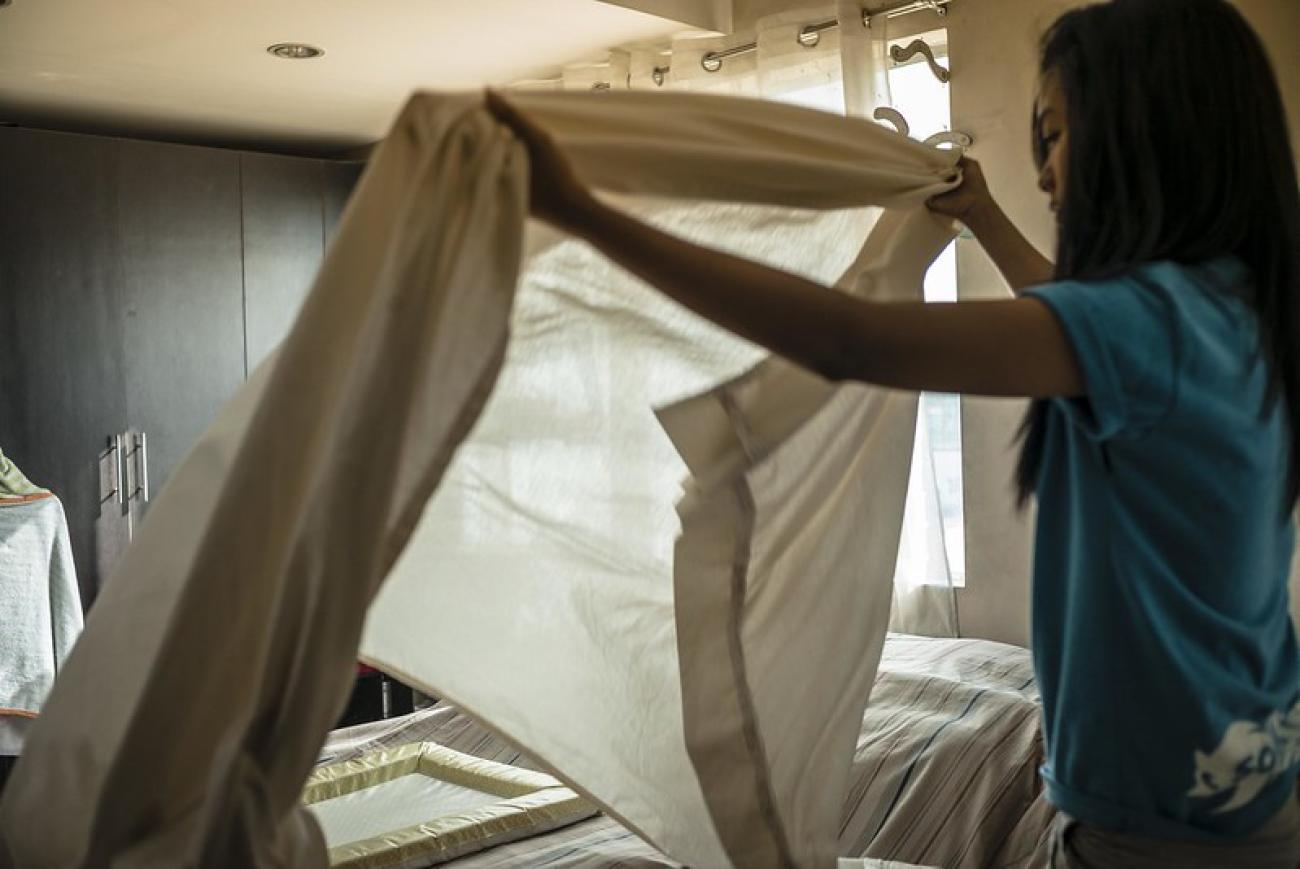International domestic workers day: hear the voices of women domestic workers

On International domestic workers day, The ILO in Myanmar commits to continue promoting and protecting the rights of domestic workers, in Myanmar and abroad.
It is estimated that over a million Myanmar women work overseas, many as domestic workers. The experiences differ for each of the women so while some have positive experiences, many women migrant workers have stories that are heartbreaking and dangerous. But despite the uncertainties of their journeys, the women still brave their way into an unknown world because working abroad offers them the opportunity to be financially secure and allows them to support their families still in Myanmar.
Nang Khin May Tun was 14 years old when she first went to work in Thailand. Now in her 30’s, she continues to work there to support her family but it was not always easy.
“There were times I cried, but I also tried to continue working very hard. Now I’m happy because the employment in Thailand has made me financially secure for my life”, she said.
Nang Khin May Tun was able to save enough money to support the migration costs for her brother and sister to also move to Thailand for work, and she also managed to save enough money to buy a plot of land and build a house in her hometown in Myanmar.
31-year-old Mary from Kayin State, who works in Singapore, shared that by working abroad, she gained self-confidence, language skills, become more broad-minded and better at communicating socially. However, it wasn’t a positive start. After overcoming apprehensions of moving to a new country where she didn’t speak the language, Mary spent two months preparing her travel documents and with the help of an agency, she was able to get a job as a babysitter in Singapore. Although the job was going well, Mary had to share the room with the baby and because she was sleeping directly under the flow of the air conditioner in the room, she began to experience aches and pains. Eight months later, she contacted the agent to seek other opportunities and while the agent assisted, he docked seven months’ worth of salary from her. Mary again had to pay him an additional two-month salary from her second job.
Mary’s is not a lone case. For many young women from Myanmar who want to seek opportunities abroad, it is normally their first time leaving the country. This means coming to terms and navigating themselves in a new culture and a language they don’t yet speak, without any support system. With many employment agencies, it’s not always easy to discern who is a licensed agent and who isn’t, especially at township and village levels where the contacts are shared through word of mouth. This can cause exploitation resulting in scams or more serious crimes like trafficking.
Migrant workers are sometimes afraid to report such incidents and there is a feeling of insecurity. Therefore, it should also be the responsibility of employers to try and provide a safe environment. U Ye Min, an employer of a domestic worker in Myanmar, believes that mutual respect and trust are critical in building a good relationship between the employer and the worker. “I provide timely health care support to my employees when they are unwell, and this also includes this period of the COVID-19 pandemic. I have also tried to cultivate a good and safe workplace for my employees according to their needs and age. As a result, we have built trust and respect between us”, he added.
Ma Wine Wutyee Ye Tint, also an employer of a domestic worker, shared that it took about three months for her to introduce her employee into the job, including introducing her to the family and to their way of life. Ma Wine Wutyee Ye Tint’s advice is for both employers and employees to share the responsibilities.
“Employers should explain the work carefully to the workers. Both employer and employees need to jointly set the house rules and regulations so that the workers can understand his/her duties and responsibilities and can become a trustful and reliable domestic worker for the house and employer”.
ILO programmes and projects focus on providing information for workers considering migrating (including domestic workers) in locations across Myanmar in partnership with social partners, civil society organizations and others. This includes raising awareness about safe migration; providing information about available support services and migration policies; and providing information about the procedures of destination countries.
Yu War Hlaing is a domestic worker who urges others like her to attend and participate in networking meetings and capacity building trainings, so they are better prepared. In 2019, she attended a training organized by Three Good Spoons, a Yangon-based cooking school operating as a not-for-profit social enterprise to promote decent work for domestic workers, with the support of her employer and in 2022, she even shared her knowledge and experiences of domestic workers and workers representation for the labour rights at Three Good Spoons organization as part of 2022 ILO Triangle in ASEAN programme.
“After my training, I was able to better communicate with my employer and I dared to address problems with the employer. I also want to tell the employers to create a workplace without any discrimination towards domestic workers but rather respect and recognize domestic works with dignity”.

